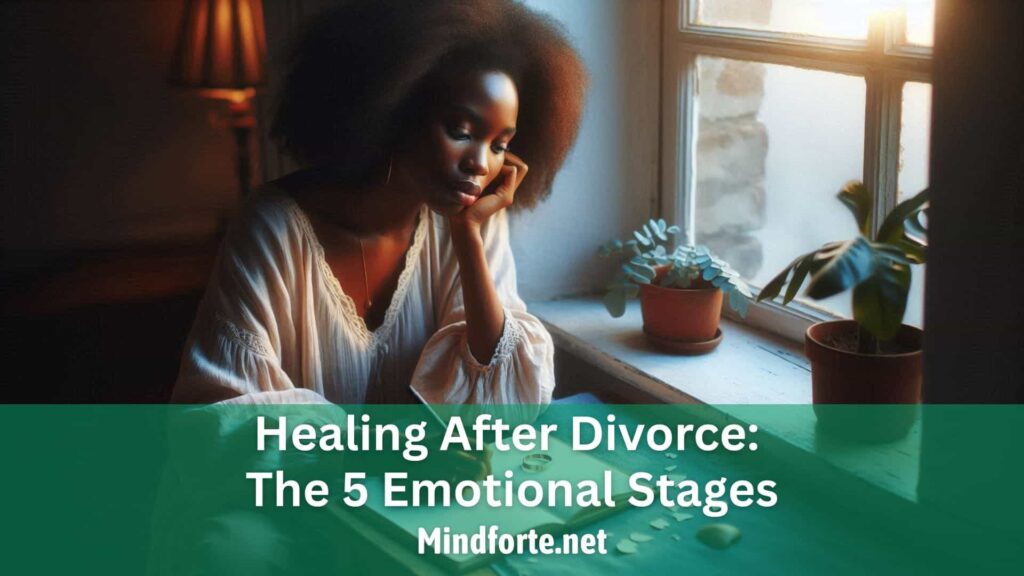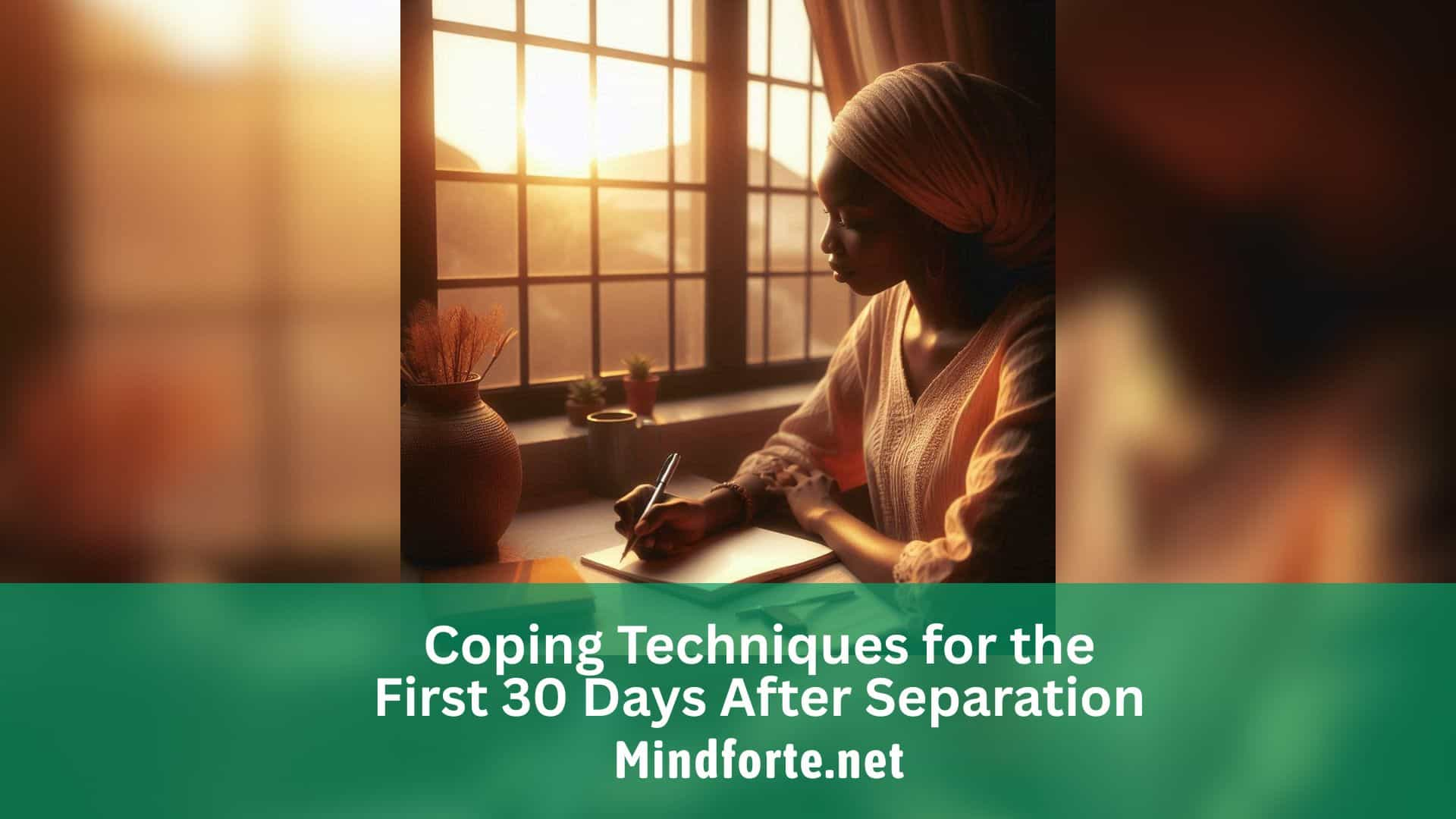You wake up one morning and everything feels… different.
The marriage that once gave you a home now feels empty.
You keep replaying moments, wondering what went wrong.
It’s a quiet ache that won’t go away—and you wonder, why isn’t the pain ending?
That’s because healing from divorce isn’t a moment—it’s a process of moving through five emotional stages.

Grief After Divorce Is Real—and Normal
Ending a marriage often feels like a silent death: of plans, friendship, family structure.
Experts call this ambiguous loss: because your partner is still alive, but everything as you knew it is gone (charlesullman.com, sueatkinsparentingcoach.com, upstreamcounselling.com, modernfamilylaw.com, psychologytoday.com).
Understanding that your mind is grieving can suddenly make the fog feel a little less lonely.
Stage One: Shock & Denial
At first, it’s like being hit by a wave.
You wake up thinking this isn’t happening.
Your brain tells you, this isn’t real.
This stage can last days or weeks.
Some people feel numb; others feel stubbornly optimistic; like if they ignore it, it’ll fix itself.
But often, denial quietly delays healing.
What you might feel: disbelief, numbness, searching for evidence that this was temporary.
Helpful steps: Talk to a friend, build a structure around meals, and sleep. You don’t need therapy yet, but mental health support can help you land softly.
Stage Two: Anger & Blame
As reality sets in, anger often follows.
Maybe you’re furious at your ex, or angry that life just… changed.
Anger isn’t wrong—it’s part of real hurt.
But unchecked, it can lead to conflict with people who care or horrible late-night texts you regret.
What to watch: Irritability, short temper, replaying hurtful moments.
Helpful steps: Journal the anger, burn it off with movement, or talk it out. If it feels overwhelming, therapy can give you safe emotional release and healthy coping.
Stage Three: Bargaining & Guilt
This is the “what if?” stage.
You might bargain with yourself—“if I’d done that differently…maybe.”
Guilt enters, even if it’s not yours to carry.
Bargaining helps your brain regain control in a chaotic time.
What to watch: Constant rumination, over-apologizing, inability to forgive yourself.
Helpful steps: Start reframing: “What I did, I did with the best intentions.” A therapist can help you find clarity and self-compassion.
Stage Four: Depression & Deep Sadness
This is the hardest stage. You may feel stuck in a fog of loneliness, tears, and emptiness.
You ache for what was, and feel like a whole part of you died. (solidfoundationstherapy.com).
Warning signs: If you’re sleeping too much or too little, losing interest in everything, or thinking “what’s the point?”, these are signs you need therapy. If you feel unsafe with your thoughts, please seek help immediately.
Helpful steps: Daily routines, connection with supportive friends/family, small growth challenges (e.g., try one new thing this week). Benefits of talking to a therapist during this stage are huge: coping skills, compassion, and emotional regulation.
Stage Five: Acceptance, Adaptation & Growth
Here, the fog starts to lift. You can smile again, even at your morning coffee.
You’re finding a new sense of self, not ex-spouse, but someone rediscovering who you are.
This stage is not about all pain disappearing, but healing alongside it.
What you’ll notice: Greater peace, more energy, new routines, and noticing hope.
Helpful steps: Celebrate growth, try something new, maybe even volunteer or support someone else. Post-traumatic growth can emerge—it’s possible to emerge stronger from the storm.
When Healing Stalls: That’s Okay, too
Healing isn’t linear. You might revisit guilt or sadness unexpectedly—and that’s normal.
Experts call it “5 steps forward, 2 back.” If you feel stuck in anger or depression longer than feels safe, that’s when psychological help can make all the difference.
How Professional Support Helps
You might wonder: Do I need therapy? Therapy in Nigeria is growing more available, and there’s no shame in seeking help.
Mindforte Psychology Clinic offers client-centered, evidence-based, mental health support tailored to your journey.
Benefits of talking to a therapist include:
- Safe space to process grief
- Tools to manage emotions
- Rebuilding confidence and identity
- Help with relationships, significance, and next steps
Trusting the Steps—and Yours
Each emotional stage is part of your unique map.
You don’t have to travel it alone.
Small acts—sharing your truth, gently curating your self-care, stepping foot into therapy—help you build a new life that feels real, rich, and resilient.
You’ve Already Done the Hardest Part
You showed up. You’re still moving, even when you don’t feel like it. That strength matters.
Healing takes months, even years—so be gentle with yourself.
You deserve compassion, understanding, and time. And support.
Book an appointment here: www.mindforte.net/booking
If you’re ready to rebuild your peace and joy, you don’t have to walk the path alone.
References
- Verywell Health. Understanding Divorce Grief. https://www.verywellhealth.com/divorce-grief-5208157 (verywellhealth.com, solidfoundationstherapy.com)
- Modern Family Law. The Five Stages Of Divorce. https://www.modernfamilylaw.com/resources/from-shock-to-acceptance-unpacking-the-five-stages-of-divorce/ (modernfamilylaw.com)
- Psychology Today. 6 Stages of Separation or Divorce. https://www.psychologytoday.com/us/blog/fixing-families/202303/6-stages-of-separation-or-divorce (psychologytoday.com)
- Calabrese Budner. The 3 stages of healing from divorce. https://calabresebudner.com/blog/2021/04/2021-04-the-3-stages-of-healing-from-divorce/ (calabresebudner.com)
- Jen Grice. 7 Phases of Divorce Recovery. https://jengrice.com/7-phases-of-divorce-recovery/ (jengrice.com)
- Wikipedia. Post-Traumatic Growth. https://en.wikipedia.org/wiki/Post-traumatic_growth (en.wikipedia.org)


